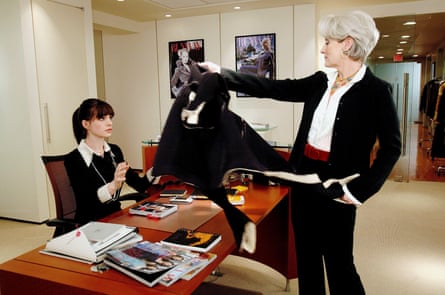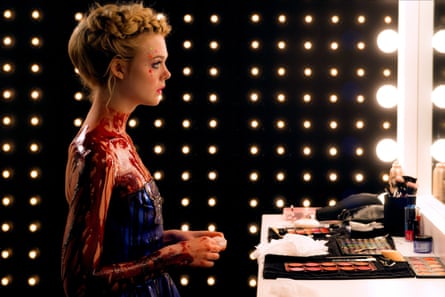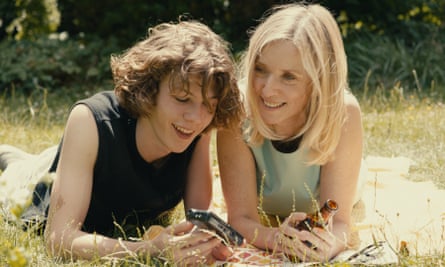For those who bleat on about the iniquities of supposed “cancel culture”, the career of British fashion designer John Galliano is a useful counterpoint. Sacked in 2011 as the creative director of Christian Dior after an appalling incident of antisemitic abuse on his part, he spent two years in the wilderness before being hired by Oscar de la Renta and subsequently Maison Margiela, where he has been for a decade. A-listers still wear his gowns on red carpets. Life goes on. Kevin Macdonald’s documentary High & Low: John Galliano (streaming on Mubi from 26 April) chronicles Galliano’s rise and fall and rise with a more distanced, critical eye than you may expect from a film co-produced by Vogue publisher Condé Nast. There’s due appreciation of his distinctive design sensibility, but sharp scrutiny of personal flaws enabled by an unruly, permissive industry.
With its loucheness and capacity for bad behaviour, the rag trade has always made a great film subject: the clothes provide the visual dazzle while the volatile business of it all provides the drama. Macdonald’s film is the latest in a recent run of fine fashion docs: Ian Bonhôte and Peter Ettedgui’s ravishing McQueen told the markedly more tragic story of Alexander McQueen, the ill-fated enfant terrible of the industry, with a formal flamboyance well matched to his extravagant aesthetic and a humane consideration of his demons. Frédéric Tcheng’s Dior and I isn’t as burdened by pathos in its spectacular overview of designer Raf Simons’s debut season for the venerable French fashion house, but is compelling in its detailing of creative process. The same film-maker also made Halston, a tricksily framed but compulsive portrait of the disco-era American designer, who went from ubiquitous tastemaker to sellout by the time of his Aids-related death in 1990.
The French have a curious habit of making biopics of their most celebrated fashion icons in near-simultaneous pairs: in 2009 we got two Coco Chanel dramas, with the businesslike, Audrey Tautou-led Coco Before Chanelcentred more on the subject’s work than the fancifully imagined, plushly romantic Coco Chanel & Igor Stravinsky, with a smouldering Mads Mikkelsen as Chanel’s equally famous alleged lover. Five years later it happened again. With a César-award lead performance by Pierre Niney, Yves Saint Laurent gave a proficient rundown of the queer innovator’s career and key relationships, but a few months later it was Bertrand Bonello’s glossier, more heightened Saint Laurent that captured his wild sensual energy. Strange, then, that the latter can’t be found to stream in the UK, though it’s worth the DVD purchase. In all four films there’s a reverence for the clothes themselves that you may expect from French film-makers. Certainly, Ridley Scott didn’t seem to care much for the couture aspect of his rather greyly handsome biopic House of Gucci; it’s the murderous melodrama behind the label that the film feasts on.

It’s a tough industry to satirise. An enduring crowdpleaser, The Devil Wears Pradadoesn’t exaggerate the cruelties of the fashion-mag world, but cannily calls out its high-minded heroine on her above-it-all contempt for the whole industry – at least before it sentimentally tries to have it both ways. Despite an astonishing all-star cast, Robert Altman’s frenetically busy but surprisingly leaden Prêt-à-Porter couldn’t beat the business at its own farcical game, but Ben Stiller’s lovably goofy male-model takedown Zoolander got the balance just right between wilful stupidity and recognisable truth. In contrast, the candy-bright, Gershwin-scored musical Funny Face offers pure, delicious wish-fulfilment fantasy in its portrait of high-fashion modelling – beginning with the outrageous initial positioning of Audrey Hepburn as a bookish frump.

Nicolas Winding Refn’s underrated The Neon Demon cleverly took the extremes of catwalk modelling and its physical demands as the premise for some truly grotesque body horror. A very different sort of horror film, Olivier Assayas’s Personal Shopper used the cool, aloof nature of the celebrity-styling business as the perfect backdrop for a chicly frosty ghost story, clothes allowing Kristen Stewart’s haunted heroine an occasional out-of-body escape. Meanwhile, the Disney prequel Cruella gave the pelt-poaching villain an apposite backstory by making her a vampy fashion maven: it’s not quite dark enough, but the frocks are fab.
For sheer divadom, she can hardly outpreen Daniel Day-Lewis’s hilariously prissy mid-century London couturier in Paul Thomas Anderson’s off-kilter romantic drama Phantom Thread, one of the great films about the muse-artist battle. The peculiar 1975 Diana Ross vehicleMahogany, meanwhile, proves how hard it is to make a purely sympathetic protagonist out of a fashion designer: Ross’s eponymous heroine struts and grits and weeps her way to the top, but we only have eyes for her incredible caftans.
All titles widely available to rent or buy unless specified.
Also new on streaming and DVD this week
Last Summer
(BFI Player)
Strangely bypassing cinemas and being released exclusively to the BFI Player, the first film in a decade from veteran French provocateur Catherine Breillat was one of the true wicked pleasures of last year’s Cannes festival. Remaking and improving on the 2019 Danish film Queen of Hearts, it stars a superb Léa Drucker as a well-to-do middle-aged lawyer imperilling her family and her social status for a reckless affair with her teenage stepson. What sounds tabloid-lurid emerges as a tart, jagged and very funny examination of female sexuality and the social standards that bind it.

The Three Musketeers: Milady(Apple TV+)
This French revival of the old Dumas saga continues to be – in its second instalment – an absolutely bounding romp in the old-school swashbuckler mode, untainted by smarmy postmodern irony. Lavishly mounted and perfectly cast, it almost makes you hope for a continuing franchise.
Akira Kurosawa’s Dreams
(Criterion Collection)
A typically gleaming Criterion Blu-ray release for this 1990 work by Kurosawa, an eccentric but sometimes beguiling patchwork of eight vignettes pulled from his then elderly subconscious – including an encounter with Vincent van Gogh, played, in something of a cinephile fever-dream flourish, by Martin Scorsese.
Source: theguardian.com


